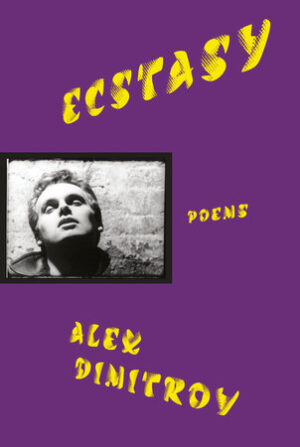Ecstasy: Poems
by Alex Dimitrov
reviewed by Kristian Josifoski
Brat Summer is back. Alex Dimitrov’s Ecstasy is a wild romp through decadence in the truest sense of the word. Dimitrov’s poems go full throttle to the heights and lows of existing in excessiveness, true to the decadent tradition. Dimitrov’s speakers attend parties, day drink, stay up till dawn, engage in kinky sex, contemplate past (and failed) loves, and struggle to get their act together. But at least there are party drugs. Ecstasy begins with “The Years,” in which the speaker exits a party for a smoke and observes from the balcony:
… it turns out no one
had the childhood they wanted,
and how’d they tell you this
a little drunk, a little slant
in less time than it took
to finish a cigarette
because sad things
can’t be explained.
Nevertheless, our speaker assures us “it’s important to go to parties. To Make / life a dress or a drink / or suede shoes someone wears / in the rain.” Dimitrov’s speakers are aware of pain, loneliness, and uncertainty, but this doesn’t stop them from indulgence. Pain and indulgence are the only truths in Ecstasy. Drugs are fun—“Poppers”—but also serious—“Xanax.” There are poems set in France and Italy. Poems for each one of the seven deadly sins. “Blond Summer” reenacts a Kenneth Anger-style blood-sport ritual of pain and pleasure.
“Everything Always” is about coming home from a late night. The speaker leaves a party at early dawn and meanders through the city, thinking of the day’s plans, the strangeness of being human, leather pants, and moving to Greece. The speaker ends the poem with:
Today I only have time
to walk to the water.
I do that. I love it.
Who wants to go home, anyway?
Who wants to be what they are?”
Eliot once said “Hell is oneself.” Dimitrov is not as serious. Many poems in Ecstasy are laugh-out-loud funny. In “Alex, It Was Really Nothing,” a play on The Smiths song, the speaker says:
… it’s the one Smiths song
I want to hear at a bar and never will
because it’s too sad and too short
and too beautiful—and not everything
beautiful gets what it deserves. Okay!
Life is pain. I think we all know that.
It’s fine. Whatever. Just play the next fucking song.
Maybe life is too sad and too short and too beautiful. At least we have the latter.
Dimitrov loves Jesus. The son of God makes several appearances, most notably in “Paris.” “Jesus was everywhere with me those days in July,” says our speaker, who seeks escape through pleasure in Grindr hookups, downing bottles of Chablis and Côtes du Rhône, and oblivion.
… I wanted to dig
so far down, if I left myself there
how could anything touch me.
You know, Judas was obsessed
with Jesus. Their kiss. His face.
Everything about him
and how the criminals were him.
The prostitutes. Sinners.
The poor. The wretched.
And Jesus, the first one of us maybe
to find out that anyone who wants you
will surely betray you.
Anyone who wants you (turns out)
may not love you at all.
Dimitrov’s Jesus is more akin to the human Jesus of Nikos Kazantzakis than, say, John the Apostle’s. The speaker identifies not with the incarnation, but with the sinners. Dimitrov’s speakers are not Jesus Christ figures, nor do they seek to be. One of the most effective approaches of Dimitrov’s poetics is that his speakers are not the heroes of their poems. “Friday” contains one of the most memorable lines in Ecstasy: “In another life I’ll have self-control or actually be happy.” We see people who struggle, who don’t know themselves, their place in life, or anything, really.
There are tender moments in Ecstasy. “1995” recalls a boyhood friendship. “Tuesday” is a poem of renewal. The final poem, “Tripping in the USA,” is a kind of ode to those of us who are just trying to get through life without knowing anything about it. Dimitrov does not give answers, advice, not even resolution. Life is enough.
Ecstasy is a Whitmanian celebration of life. There is beauty everywhere and in all things, and you best believe you can do what you want in this life. Without a doubt, this is Dimitrov’s best work to date. His previous collection, Love and Other Poems, introduced a new voice to his poetry: punchy, sharp, moving, funny, light-hearted. This voice continues in Ecstasy but with more grit, darkness, irony, and hilarity. Ecstasy is about loving things while being rough around the edges. To quote “Tripping in the USA,”
If you forget
who you are
why you’re here
where you’ll go
what you’re doing.
I’m with you.
I’m with you.
I’m with you
forever.
Published on June 3, 2025

